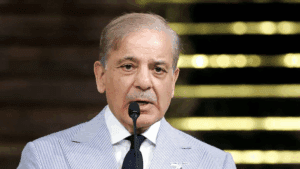Pakistan’s Chief of Army Staff, General Asim Munir, has called on the nation to uphold and pass down the ideological foundation that led to the creation of the country Army in 1947. Speaking at the Convention for Overseas Pakistanis in Islamabad, General Munir strongly invoked the Two-Nation Theory, reaffirming the belief that Muslims and Hindus are inherently different and cannot coexist as a single nation. This theory, originally championed by Pakistan’s founder, Muhammad Ali Jinnah, formed the ideological bedrock of the country’s creation as a separate homeland for Muslims following the partition of British India.
Also Read : Ranveer Allahbadia on What He Lost in ‘India’s Got Latent’ Row
Munir Calls on Nation and Army to Uphold Founding Ideals
Our forefathers believed that we were different from Hindus in every possible way our religion, customs, traditions, values, thinking, and aspirations, Munir said during his address, adding, “That belief laid the foundation of the Two-Nation Theory. We are two separate nations, not one. Urging the public to keep this ideology alive, Munir emphasized the importance of educating future generations about Pakistan’s origin and the sacrifices made to establish it. You must tell your children so they never forget the story of Pakistan, he stated. Our forefathers made immense sacrifices, and we too have made sacrifices for this country. Please do not forget this story.
Also Read : UP Woman Elopes with Daughter’s Groom Before Wedding
Munir Reinforces Pakistan’s Islamic Foundation and Two-Nation Theory
The speech, delivered in the presence of Prime Minister Shahbaz Sharif, reflected the Pakistan Army’s ongoing reliance on the Two-Nation Theory as a defining element of national identity, especially in relation to India. General Munir, who is also known as a Hafiz-e-Quran (one who has memorized the Quran), further underscored that Pakistan was founded on Islamic principles, with its ideological foundation rooted in the Kalima the Islamic declaration of faith.
Also Read : Scientists Find Strongest Evidence Yet Of Life On An Alien Planet
Decline of Minorities and Ongoing Criticism of Their Treatment
While Pakistan was originally established as an Islamic republic that promised protection and equal rights to its minorities including Hindus, Sikhs, and Christians the demographic presence of these groups has significantly declined over the decades. The country has faced ongoing criticism for its treatment of minority communities, both from international observers and human rights organizations.
Also Read : U.S. sanctions Chinese refinery for buying Iranian oil amid trade war
India’s Criticism at the United Nations
Munir’s rhetoric, centered on the Muslim-Hindu divide, came at a time of renewed diplomatic tensions with India. His speech followed India’s sharp rebuke of Pakistan at the United Nations, where New Delhi accused Islamabad of repeatedly raising the Kashmir issue in irrelevant forums. India also reiterated its stance that Pakistan should vacate territories it considers illegally occupied.
Also Read : Justice BR Gavai to Become Next CJI, Oath on May 14
Tough Message to Separatist Movements
In the same address, Munir also turned his focus inward, vowing to crack down on insurgent groups operating within the country, particularly in the troubled province of Balochistan. He issued a strong warning to separatist elements, declaring that even ten generations of terrorists cannot harm Balochistan or Pakistan. His comments signaled a hardline approach to internal security threats, amid continued unrest in the region driven by nationalist and separatist movements.
Also Read : CBI raid at AAP leader Durgesh Pathak’s house days after he was named Gujarat polls in-charge, claims party











More Stories
India’s Active Covid-19 Cases Rise Above 2,700; Delhi Records First Fatality
Pak PM: India Fired Brahmos Before Our Retaliation
देहरादून: सूर्यधार रोड पर भिड़ीं गाड़ियां, शख्स को कुचलने की कोशिश; 9 गिरफ्तार